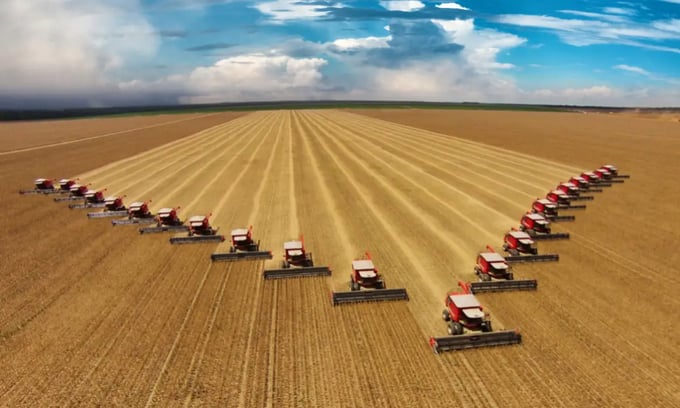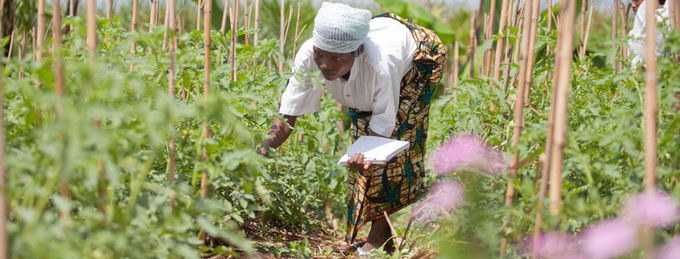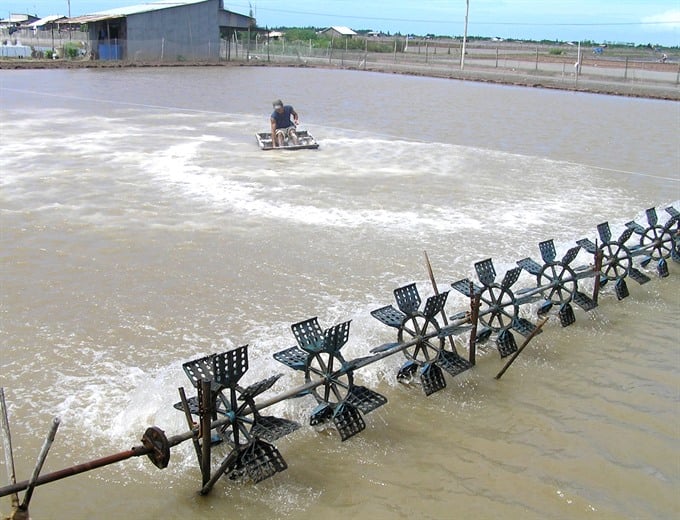May 30, 2025 | 11:33 GMT +7
May 30, 2025 | 11:33 GMT +7
Hotline: 0913.378.918
May 30, 2025 | 11:33 GMT +7
Hotline: 0913.378.918

Three authors of this OpEd (from left to right): Víctor Manuel Villalobos Arámbula, Saruth Chan, Dao The Anh.
Moreover, they contribute to forest destruction, the displacement of communities, water pollution and soil degradation. They are often based on chemical-dependent monocultures which makes them vulnerable to disease and climate related shocks. Today, this model of industrial agriculture is no longer fit for purpose.

We therefore need to rethink our food systems and transition to diversified agroecological systems.
As the COP28 climate talks kick off in Dubai this week it is urgent to both drastically reduce greenhouse gas emissions from food and farming, and for our food systems to become more resilient to the extreme events the climate crisis is creating. We therefore need to rethink our food systems and transition to diversified agroecological systems that can ensure we address this twin challenge, and to provide nutritious diets to a growing population without destroying the planet.
Switching to agroecology offers a way to produce food within diverse landscapes growing and nurturing different crops, livestock and fisheries suited to the conditions and communities that live in the area. Agroecological practices improve the health of farmed soils, making them more resilient to floods and droughts, while increasing their capacity to sequestrate carbon and to preserve water. Agroecology also contributes to 15 out of the 17 UN Sustainable Development Goals including addressing poverty by increasing local incomes, improving health through more nutritious diets and less exposure to harmful chemicals, as well as addressing gender inequality by involving local communities.
Backed by scientists, social movements, farmers and governments, agroecology is already providing solutions across the world. In Mexico, climate change has caused a decline in yields – including a 35% reduction in the bean crop – while increasingly ferocious hurricanes have wiped out fruit crops. The country has pioneered a move towards agroecology for two decades and has already seen a 4% improvement in rural food security. For example, some farmers are now producing drought-resistant nopal cacti to feed their livestock. Using native plants that need little water helps farmers face a drying climate, while it also reduces the climate and environmental footprint of growing, processing and transporting industrially farmed animal food.
Small holders are witnessing the recovery of the fertility and moisture levels of their soils, higher productivity and competitiveness. Researchers have found that when agroecology is combined with the right type of seed, it improves the resilience of crops, increases soil carbon and produces healthy and nutritious food combined with social justice and inclusion for rural populations.

Agroecological practices improve the health of farmed soils, making them more resilient to floods and droughts. Photo: FAO.
In Cambodia, the trend of soil fertility depletion in the uplands but also in the lowlands reduce the ability to absorb water during heavy rains, decrease soil nutrient contents increasing dependency to inorganic fertilizer and thus production costs. The government has started a move towards agroecology with a focus on annual rainfed cropping systems and the promotion of legume cover crops (N-fixing plant species). Positive soil organic carbon accumulation is recorded under cropping systems that combine use of cover crops and no-till management. In addition, network of seed producers of cover crops is expanding and allow at the same time to protect the land while the seeds provide an extra source of income to smallholder farmers.
However, the country needs to scale-up agroecology and help farmers to make the transition. Governments, the private sector, farmers and researchers need to collaborate to find solutions. Cambodia has launched a consortium to mobilize the different players, and support from the international community would help roll-out the benefits of agroecology.
In Vietnam rising sea levels are impacting rice crops while mountainous monocultures are suffering from soil erosion during heavy rains. Rice farmers are beginning to move from intensive rice farming – which involves three harvests each year with insecticides and fertilisers – to one organic rice season during wet periods and one shrimp season during times of salt water intrusion. Meanwhile, farmers in the mountains are switching to agroforestry with several crops like mango, avocado and peanut.

Shrimp farming tackles sea-level rise in Vietnam. Photo: VNA.
The Vietnamese government has a strategy to transition to agroecology by 2030, farmers need support during the transition to more diverse agroecological systems, as their incomes may initially decline, before increasing and becoming resilient.
COP28 can encourage a food system transformation based on the principles of agroecology. With financial support and knowledge sharing farmers can make the switch to a future-proof food production system. By creating mechanisms that connect farmers, seed providers, trainers, financers, innovators, retailers and other players in the food sector across the world, COP28 can build the momentum for agroecology.
At the same time, consumers must be made aware of the benefits of sustainable, healthy, socially just and nature-friendly products.
Today our food systems are on the frontline of the climate emergency. Agroecology is a proven and ready solution to change this, and the scientific evidence of the potential of agroecology to address the multiple crises is there. We encourage decision-makers meeting at COP28 to support the transition through policies, financing and knowledge sharing platforms.
OpEd signed by:
Víctor Manuel Villalobos Arámbula, Secretary of Agriculture and Rural Development of Mexico
Saruth Chan, Under-Secretary of State for the Ministry of Agriculture, Forestry and Fisheries of Cambodia
Dao The Anh, Vice-President of Vietnam Academy of Agricultural Sciences (VAAS)

(VAN) The mutual export of agrifood products between the European Union (EU) and the United Kingdom (UK) must occur again without certification, border controls or other red tape. This was agreed at the UK-EU summit.
/2025/05/22/5121-2-173645_677.jpg)
(VAN) NBSAP Tracker identifies strengths and areas for improvement in the National Biodiversity Strategy, based on each region’s priorities and capacities.

(VAN) The draft amendment to the Circular on rice export trading stipulates a periodic reporting regime for rice exporting enterprises.

(VAN) Dong Thap farmers attained an average profit margin of 64% during the summer-autumn 2024 crop (first season), while An Giang and Kien Giang farmers followed with 56% and 54%, respectively.

(VAN) As a doctoral student doing research on renewable energy and electrification at Harvard University, the author shares his musings on electricity, nature, and countryside memories.

(VAN) The decree on Extended Producer Responsibility (EPR) ensures transparent management and disbursement of support funds, avoiding the creation of a “give-and-take” mechanism.

(VAN) Hue City rigorously enforces regulations regarding marine fishing and resource exploitation, with a particular emphasis on the monitoring of fishing vessels to prevent illegal, unreported, and unregulated (IUU) fishing.